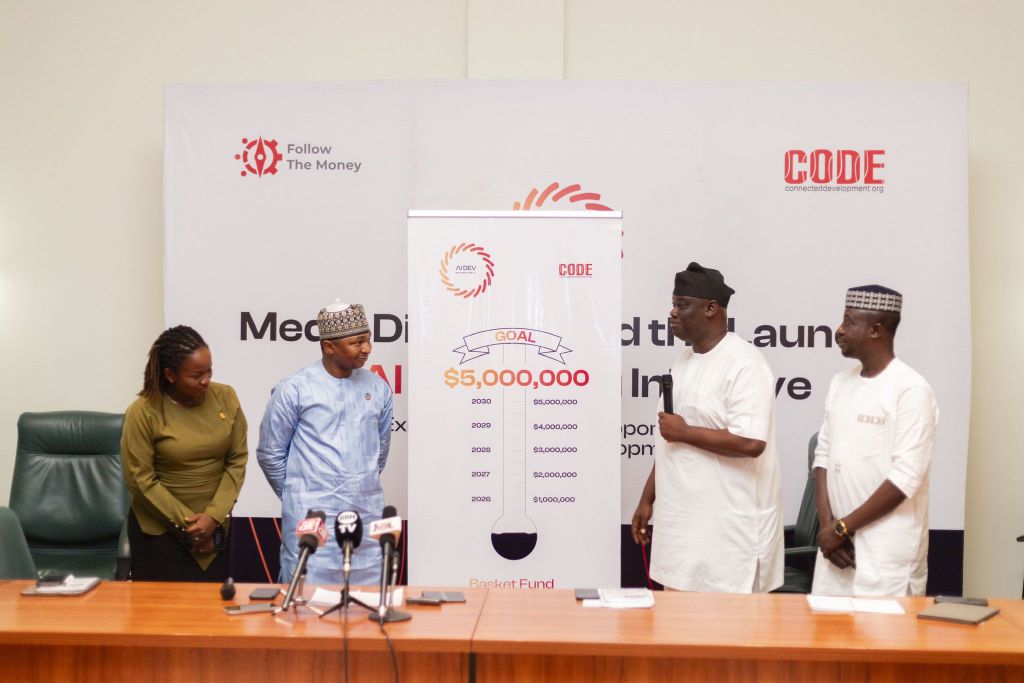
Connected Development (CODE) has launched a $5 million media grant to empower Nigerian journalists in artificial intelligence (AI) reporting.
The fund, announced by CEO Hamzat Lawal during a high-level media roundtable attended by Pulse Nigeria in Abuja on Tuesday, March 25, seeks to bolster AI-driven storytelling in key sectors such as health, education, climate change, and governance.
"Today, I am pleased to launch a $5 million project. Every year, for the next five years, one million dollars will be allocated to provide journalists with the resources, skills, and tools needed to leverage artificial intelligence in reporting," Lawal declared.
The roundtable brought together esteemed media and governance stakeholders, including Dr. Majeed Dahiru, Lucy James Abagi (CEO of Public and Private Development Centre), and Seun Durojaiye (Founder and Managing Editor, SocialVoices Nigeria), to discuss AI’s transformative potential and its ethical challenges.
AI and the Future of Nigerian Journalism
Lawal emphasised that AI, though often misunderstood, is an extension of machine learning and big data.
"It is what you feed the machine that it gives back to you. The real question is: How do we ensure that citizens are at the heart of AI adoption in Nigeria and across Africa?" he asked.
READ ALSO: Nigeria launches Africa’s 1st AI tool to track carbon emissions
He warned that failure to integrate AI effectively could pose risks to democracy, governance, and public trust.
Speaking on the infrastructure gap, he noted that most AI servers are located in Europe and the United States, raising concerns about data sovereignty.
"Where is all this data stored? If their servers crash today, we wouldn’t even be able to send emails or post on WhatsApp," he said, urging local investment in AI infrastructure.
Ethical Concerns and Misinformation Risks
Dr. Majeed Dahiru provided critical insights into AI’s opportunities and risks. He highlighted ethical concerns, fears of job displacement, risks of misinformation, and AI bias as key challenges.
"AI can create convincing fake news and deepfake videos. In a world where media shapes opinions, this is dangerous. We must ensure that truth prevails," Dahiru warned.
However, he also outlined AI’s transformative potential in media.
"AI tools can generate articles, analyze audience behavior, fact-check content, and automate video editing, making media production more efficient. News agencies like the Associated Press already use AI for financial reports and sports summaries," he noted.
READ ALSO: 5 industries that AI is quietly taking over
Durojaiye, on the other hand, held a different view of news consumption in Nigeria and how trivial content had replaced painstaking investigative reporting.
She stated that these investigative pieces don't enjoy social media reactions and engagements like trivial content.
However, Segun Adeyemi of Pulse Nigeria countered this perception by questioning the business model of media organisations that conduct investigative reports.
Adeyemi suggests that more financial priority should be placed on their social media platforms and backends to achieve their desired aim and reach their target audience.
"There are a billion and one news content out there ready for consumption daily. Competitors won't wait for you, or else you would be late to the party," he said.
Balancing AI and Human Creativity
Dahiru stressed that AI should complement human creativity rather than replace it.
"The key is balance. Use AI for speed and efficiency but ensure humans remain central to storytelling. Media thrives on emotions and authenticity—things AI cannot fully replicate."
Great News! ????
— Connected Development [CODE] (@Connected_dev) March 25, 2025
Connected Development (@connected_dev) launches $5,000,000 basket fund/grant to support Media in Nigeria on AI reporting and exploring new opportunities to accelerate development in Health, Education, Water and Sanitation Hygiene (WASH), Climate Change, Governance… pic.twitter.com/2sF1EN55yg
He called for ethical AI guidelines, transparency from AI developers, and bias detection tools to ensure fairness in media content.
"AI should enhance, not replace, human effort," he asserted.
A Call to Action
As Nigeria advances toward 2030, Lawal reaffirmed CODE’s commitment to supporting media professionals in AI integration.
"We are deliberate about this. Connected Development would not be here without journalists. Journalism is a calling—just like activism. We will provide financial resources to help you leverage AI in your work."
With AI rapidly reshaping the media landscape, stakeholders at the event agreed that responsibly embracing AI is crucial to safeguarding journalism’s integrity while harnessing its full potential for national development.